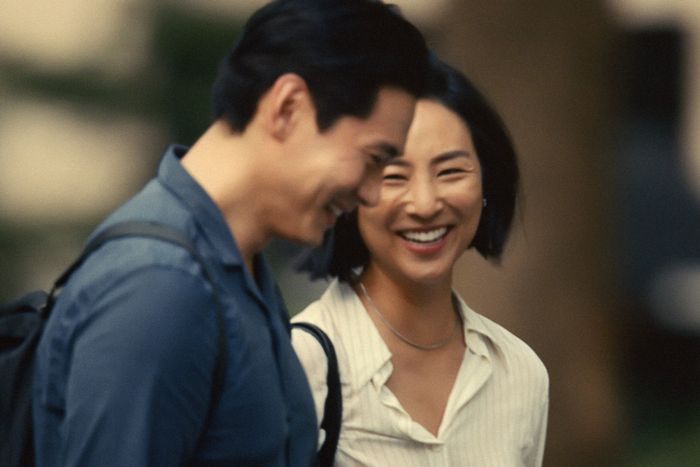
On January 23, 2024, Past Lives was nominated for two Oscars, including Best Picture. Be sure to also read our profile of filmmaker Celine Strong.
Past Lives is a lopsided love story trying to pass itself off as a mutual one. The urge is understandable. Presented as a shared experience, the film’s events take the shape of a meditation on paths not taken, stretching over a quarter-century and half the globe. It picks up with childhood sweethearts Nora (Greta Lee) and Hae Sung (Teo Yoo), who part ways when Nora’s family emigrates to Canada from Seoul. Twelve years later, when Nora’s getting an M.F.A. in the U.S. and Hae Sung’s doing his compulsory military service, they reconnect digitally. Twelve years after that, they meet up again in New York, where Nora now lives with her husband Arthur (a perpetually rumpled John Magaro), and where Hae Sung has come on a vacation that turns out to mostly be an excuse to see Nora again. It’s muted and golden-toned and overtly Before Sunset–esque, but there’s a disconcerting shrewdness underneath its patina of tastefulness — it’s too calculating to achieve the transcendent almost-romance it strives for but never inhabits. To put it less wistfully, another way to describe the film is that it’s about making hay of the not-uncommon occurrence of getting hit up by some long-ago ex who’s feeling lonely and maudlin online.
Past Lives, the directorial debut of Celine Song, is semi-autobiographical, and while Song’s preferred not to name the Korean man who inspired the character of Hae Sung, Arthur presumably owes something to her IRL husband Justin Kuritzkes, a fellow writer. Nora is, like Song, a playwright, and it isn’t the first authorial stand-in that Song’s put in her work. Song’s play Endlings, whose 2020 run was cut short by the pandemic, was about a trio of elderly Korean women divers until it shifted to become instead about the New York–based playwright who felt trapped into writing these characters by the avid interest of white supporters. But Song doesn’t seem willing to follow those tensions through to genuine discomfort. Endlings, having acknowledged the pressure to perform race, turns to satirizing a “white play” instead. Past Lives begins with a shot of Nora, Hae Sung, and Arthur sitting at a bar while the camera slowly zooms in and two off-camera patrons try to guess what the relationships between the three of them are. “It was the way people were looking at us,” Song explains of her memory of the real-life encounter and the seed of the film, and you might wish she’d go on to explain exactly why she thinks the sight of an Asian man and woman sitting with a white guy would be so intriguing to strangers.
It isn’t that intriguing in the movie, which uses its subdued tone to elide how little texture or tension it has. Part of the reason Past Lives glides along so frictionlessly is that while it splits its time between Nora in New York and Hae Sung in Korea, it’s only Nora who feels like a whole being. Nora has her ambitions, trying to scale the New York theater scene from within, while Hae Sung, who’s studying engineering, comes across as someone whose life is without a gravitational center in Nora’s absence. When Nora first encounters Arthur at a writers’ retreat, their flirtation plays out under fairy lights in the yard, while Hae Sung’s meeting of his eventual girlfriend while in China gets cut off before the two ever speak to one another, as though the film has exhausted its willingness to imagine his life outside of Nora’s orbit. He’s a vessel for diasporic longing — the two speak Korean when they’re together, a language Arthur know only a smattering of — as well as a representative of the life she left behind to grow into another person who retains traces of the girl she was. But that longing is itself as unconvincing as the deep ties these two people are meant to retain from a childhood crush. Lee, a perpetually undervalued actor, punctures the film’s attempts at billowing romanticism with her innate sharpness.
Though Nora mentions looking at flights to Seoul when she and Hae Sung start talking in their 20s, the film never creates any real sense that she’s torn or yearning to return, even for the guy she’s been engaging in a flurry of Skype conversations with. “Koreans don’t win the Nobel Prize for literature,” she sassily informs Hae Sung when they’re kids, and the prizes and recognition she mentions over the years become specifically American. When, in the final act, Hae Sung turns up specifically to see Nora again, Arthur says, “I was just thinking about what a good story this is,” describing himself as “the evil white American husband standing in the way of destiny”: “I can’t compete.” Rather than underscore the character’s enlightened nature, his patience and understanding, it emphasizes how unserious Hae Sung’s visit is seen to be — Hae Sung is always the one reaching out to Nora, while Nora determines the boundaries of the time they’ll spend together. In bundling the issues of identity, cultural ties, and rootlessness to love interests, the film shrinks them down into something that feels negligible, and then tries to give itself added heft with the idea of inyun — the connection between people built up over all their past lives. When Nora first explains inyun to Arthur under those warm lights at night at the retreat, she jokes that the spiritual concept is “just something Koreans say to seduce someone.” By the time the idea of inyun comes back up in earnest, it feels like it’s actually the audience that’s being had.
More Movie Reviews
- Anyone But You Has More Sex on Its Mind Than Your Average Rom-Com
- An Exploited Neighborhood, Seen Through Children’s Eyes
- Challengers Is Almost a Sexy Movie





